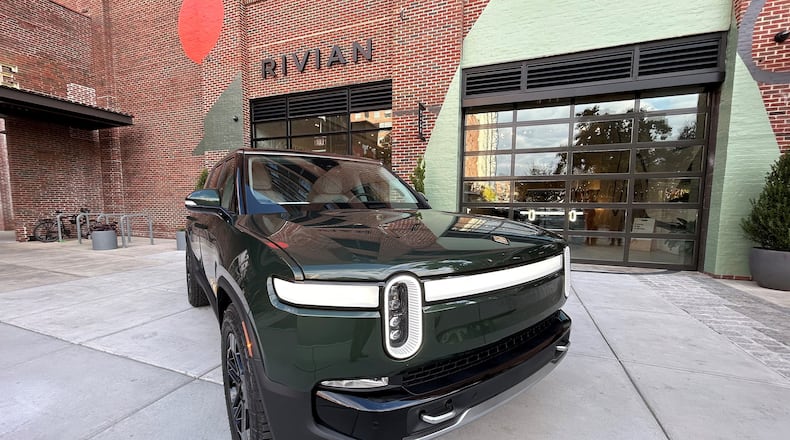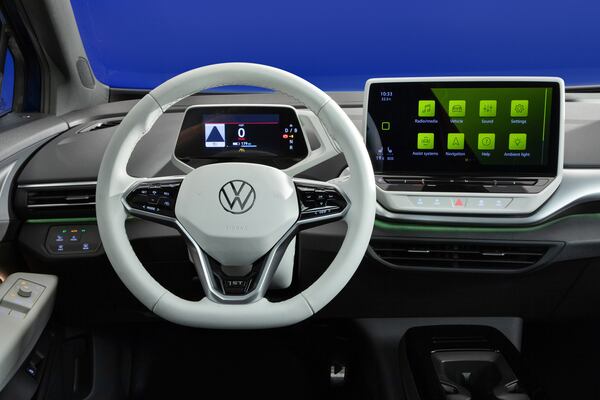Electric vehicle startup Rivian and German automobile giant Volkswagen finalized their joint venture Tuesday, a $5.8 billion deal that could prove transformational for both automakers.
They are partnering to develop software for their next-generation EVs through a separate entity helmed by top Rivian and VW officials. Called “Rivian and VW Group Technology LLC,” the joint venture provides Volkswagen access to Rivian’s technology platform while juicing the startup’s balance sheet as it aims to make the jump to being a profitable company.
Rivian CEO R.J. Scaringe previously said the capital investment will help support the launch of a new R2 crossover at its current factory in Normal, Illinois, and help make its planned $5 billion factory an hour east of Atlanta a reality. He reiterated that Tuesday.
“Certainly this partnership and this deal secures the capital for us to ensure that we can not only take Rivian through the launch of R2 in Normal but secures the launch and growth of our Georgia facility through (becoming) a free-cash-flow positive business,” he said.
Volkswagen Group CEO Oliver Blume said, “The partnership with Rivian is the next logical step in strengthening our global competitive and technological position.”
The joint venture will be led by Wassym Bensaid, Rivian’s chief software officer, and Carsten Helbing, VW Group chief technical engineer. The joint venture’s staff will be comprised of developers and software engineers from both companies, who will begin their partnership work Wednesday.
Credit: Courtesy Rivian and Volkswagen Group
Credit: Courtesy Rivian and Volkswagen Group
Teams initially will be based in Palo Alto, California, near San Francisco, about 400 miles northwest of Rivian’s headquarters in Irvine, California, in suburban Los Angeles. Three other sites are in development in North America and Europe.
“We’re thrilled to see our technology being integrated in vehicles outside Rivian,” Scaringe said. “This is an important enabler to help accelerate EV adoption.”
Credit: TNS
Credit: TNS
The companies also said they’ll be able to reduce development costs and more efficiently scale their new technologies by combining their efforts. In addition to supporting Rivian’s R2 launch in the first half of 2026, the partnership will support the first VW electric models as early as 2027.
‘Highly complementary’
The intention to form a Rivian-VW joint venture first came to light in June. Then valued at $5 billion, the partnership was sold as a way to improve each automaker’s weaknesses — helping with Rivian’s manufacturing inexperience and VW’s lagging tech platform.
It’s a point both companies hit Tuesday when finalizing the deal.
“It is highly complementary, reflecting Rivian’s industry-leading software and electrical hardware technology as well as Volkswagen Group’s significant global scale and industry-leading vehicle platform competencies,” the companies said in a news release.
Rivian’s flagship R1 fleet of trucks and SUVs has racked up awards, but the company has struggled with supply chain issues and has seen its cash pile shrink. That prompted the company in March to pause its planned Georgia factory — the state’s second-largest economic development project — as a cost-cutting measure, which saved the automaker more than $2 billion in the short-term.
Credit: Miguel Martinez
Credit: Miguel Martinez
Scaringe said the Georgia plant, which Rivian has promised will employ 7,500 workers in southern Morgan and Walton counties, remains a vital part of Rivian’s scaling efforts. To land the factory, state and local officials offered the company a $1.5 billion incentive package, most of which only comes to fruition after the automaker delivers its investment and employment promises.
VW said it already has invested an initial $1 billion in Rivian, taking an equity position in the startup and becoming one of the company’s largest investors. VW will invest an additional $1.3 billion as consideration for background intellectual property licenses and a 50% equity stake in the joint venture. The remaining $3.5 billion investment is expected to consist of equity, convertible notes and debt “at future dates and based on clearly defined milestones” by 2027, the companies said in the release.
Focused on scale
Volkswagen in recent years has struggled to develop EV software and has fallen behind many of its competitors. Those losses are taking their toll, with several media outlets reporting in October than VW plans to close as many as three of its German factories.
The Rivian-VW joint venture will develop what the companies called “next generation software-defined vehicle (SDV) platforms.” SDVs are vehicles that can be updated over time using software improvements.
The companies said their team was able to develop an “initial drivable demonstrator vehicle” in 12 weeks, retrofitting a VW vehicle to run on Rivian’s integrated technology platform.
Credit: Courtesy Rivian
Credit: Courtesy Rivian
Blume said the joint venture initially will focus on Rivian-VW software incorporation, but it will expand through other Volkswagen Group brands, including Audi, Scout and Porsche.
“We will be scalable, from the very small (vehicle types) to luxury cars and sports cars,” he said. “The electronic architecture will fit and will be scalable and usable for a great volume of cars.”
Rivian shares were trading up about 8% as of 6 p.m. Tuesday, after markets closed, after being down about 4% during the trading day.
Cox Enterprises, which owns The Atlanta Journal-Constitution, also owns about a 3% stake in Rivian.
About the Author








